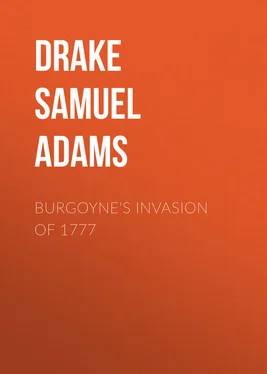Samuel Drake - Burgoyne's Invasion of 1777
Здесь есть возможность читать онлайн «Samuel Drake - Burgoyne's Invasion of 1777» — ознакомительный отрывок электронной книги совершенно бесплатно, а после прочтения отрывка купить полную версию. В некоторых случаях можно слушать аудио, скачать через торрент в формате fb2 и присутствует краткое содержание. Издательство: Иностранный паблик, Жанр: foreign_antique, foreign_prose, на английском языке. Описание произведения, (предисловие) а так же отзывы посетителей доступны на портале библиотеки ЛибКат.
- Название:Burgoyne's Invasion of 1777
- Автор:
- Издательство:Иностранный паблик
- Жанр:
- Год:неизвестен
- ISBN:нет данных
- Рейтинг книги:5 / 5. Голосов: 1
-
Избранное:Добавить в избранное
- Отзывы:
-
Ваша оценка:
- 100
- 1
- 2
- 3
- 4
- 5
Burgoyne's Invasion of 1777: краткое содержание, описание и аннотация
Предлагаем к чтению аннотацию, описание, краткое содержание или предисловие (зависит от того, что написал сам автор книги «Burgoyne's Invasion of 1777»). Если вы не нашли необходимую информацию о книге — напишите в комментариях, мы постараемся отыскать её.
Burgoyne's Invasion of 1777 — читать онлайн ознакомительный отрывок
Ниже представлен текст книги, разбитый по страницам. Система сохранения места последней прочитанной страницы, позволяет с удобством читать онлайн бесплатно книгу «Burgoyne's Invasion of 1777», без необходимости каждый раз заново искать на чём Вы остановились. Поставьте закладку, и сможете в любой момент перейти на страницу, на которой закончили чтение.
Интервал:
Закладка:
With such promise held out before it, Congress resolved to make the attempt. Forces were ordered to both places. One body, under General Montgomery, 7 7 General Richard Montgomery, of Irish birth, had served under Amherst at the taking of Crown Point and Ticonderoga in 1759, settled in New York, been one of eight brigadiers created by Congress in June, 1775; General Schuyler's illness threw the chief command, for which he proved himself eminently fitted, on Montgomery. His having served on this line was much in his favor.
mustered at Ticonderoga. Ethan Allen went before it to rouse the Canadians, who were expected to receive the Americans with open arms. This army moved down the lake in October, taking St. John's and Chambly in its way, and Montreal a little later. The other, led by Colonel Arnold, 8 8 Colonel Benedict Arnold had once been a soldier at Ticonderoga. He went there again with a commission from Massachusetts, when the fortress was taken by Allen. He had also spent some time in Quebec. These facts had influence in procuring for him a command in the invading expedition.
ascended the Kennebec to its head, crossed over to the Chaudière, which was followed to the St. Lawrence, and came before Quebec at about the same time Montgomery entered Montreal. Montgomery hastened to Arnold with a handful of men. Together they assaulted Quebec on the morning of December 31. The attack failed, and Montgomery fell. The Americans lay before Quebec till spring, when the arrival of fresh troops, for the enemy, forced ours to retreat to Montreal. This, too, was abandoned. Our army then fell back toward Lake Champlain, setting fire to Chambly, and St. John's behind it. The enemy followed close, recapturing these places as our troops left them. Very little fighting took place, but the Americans were greatly disheartened by having constantly to retreat, and by the loss of many brave officers and men, who fell sick and died of the smallpox. July 1 the army finally reached Crown Point, ragged, sickly, and destitute of everything. Weakened by the loss of five thousand men and three commanders, it was no longer able to keep the field. Instead of conquering Canada, it had been driven out at the point of the bayonet. The great question now was, whether this army could hold its own against a victorious and advancing enemy.
General Gates 9 9 General Horatio Gates, a retired British major, settled in Virginia, was made adjutant-general of the army, June, 1775.
took command of the army at this critical time. Convinced that he could never hope to hold both Crown Point and Ticonderoga, and knowing Ticonderoga to be much the stronger, in a military view, he decided to remove the army to that place at once. This was promptly done. 10 10 The Removal of the Army from Crown Point to Ticonderoga was strongly opposed by Stark and others, and disapproved by Washington.
The soldiers were set to work strengthening the old, or building new, works, under the direction of skilful engineers. Of these new works the strongest, as well as most important, because they commanded Ticonderoga itself, were those raised on the peninsula opposite the fortress on the Vermont side, which was christened Mount Independence on the day the army heard that the colonies had declared themselves free and independent.
Having thrown a bridge across the strait, between Ticonderoga and Mount Independence, the Americans waited for the enemy to come and attack them, for with such leaders as Gates and Stark they felt confident of gaining the victory.
The British were equally active on their side. After driving the Americans from Canada, they next determined to make themselves masters of Lake Champlain, recover the forts they had lost, and so gain a foothold for striking a blow at our northern colonies.
For this purpose they set about building a fleet at St. John's. Vessels were sent out from England, for the purpose, which were taken to pieces below the Chambly rapids, brought across the portage, and put together again at St. John's. By working diligently, the British got their fleet ready to sail early in October.
Well knowing the importance of keeping possession of the lake, the Americans turned Skenesborough into a dockyard, and were straining every nerve to get ready a fleet strong enough to cope with the British. As everything needed for equipping it had to be brought from the sea-coast, the British had much the advantage in this respect, yet all labored with so much zeal, that our fleet was first ready for action. Gates gave the command of it to Arnold, who had once been a sailor, and whose courage had been tried so signally under the walls of Quebec.
By the middle of August, Ticonderoga was in fighting trim. The enemy's delays had given time to make the defences so strong that an attack was rather hoped for than feared. Ignorant of the great preparations making at St. John's, the Americans also believed themselves strongest on the lake. Our fleet, therefore, went forward with confidence to the battle.
Naval battle, October 11.On the 11th of October the British flotilla was seen coming up the lake. The rival forces met at Valcour Island, and the battle began. From noon till night the combatants hurled broadsides at each other without ceasing. The British then drew off to repair damages, meaning to renew the fight in the morning. This gave Arnold a chance to slip through them unperceived, for his vessels were so badly shattered that all hope of gaining the victory was given over. He was pursued and overtaken. Near Crown Point the battle began again, but the enemy's superior forces soon decided it in his favor. Rather than surrender, Arnold ran his disabled vessels on shore, set fire to them, and with his men escaped to the woods.
Having thus cleared the lake, the British commander, Guy Carleton, 11 11 Guy Carleton, British governor of Canada, though driven from Montreal by Montgomery, had successfully defended Quebec against him. He reconnoitred Ticonderoga, but seems to have thought it too strong to be attacked with his force.
sailed back to St. John's, leaving Ticonderoga unmolested behind him, to the great astonishment of our soldiers, who said Carleton deserved to be hanged for not following up his victory over Arnold.
BURGOYNE'S INVASION
I.
THE PLAN OF CAMPAIGN
After the British had gone back to Canada, it was thought they would return as soon as the lake should be frozen hard enough to bear artillery. But when it was found that they had gone into winter quarters, and the danger was past, part of the garrison of Ticonderoga was hurried off to Washington, who was then fighting against great odds in the Jerseys. This winter was the dark hour of the Revolution, upon which the victory at Trenton 12 12 Victory at Trenton. After being driven from the Jerseys, Washington suddenly turned on his pursuers, and by the two fine combats of Trenton and Princeton, compelled much superior forces everywhere to retreat before him, thus breaking up all the enemy's plans for the ensuing campaign, saving Philadelphia, and putting new life into the American cause.
shed the first ray of light. So low had the American cause fallen at this time, that, but for this unlooked-for success, it is doubtful if another army could have been brought into the field.
The British were really planning to invade New York as soon as the lakes should be open again, in the spring. For this campaign great preparations were making, both in Canada and England. Quiet, therefore, reigned at Ticonderoga throughout the winter of 1776 and 1777.
General Burgoyne sailed for England in November, to lay before the king a plan for subduing the colonies in a single campaign. Burgoyne was a good soldier, popular with the army and government, brave to rashness, but vain and headstrong. He knew the Americans were not to be despised, for he had seen them fight at Bunker Hill, as well as in the campaign just closed, in which he himself had taken part; yet an easy confidence in his own abilities led Burgoyne into committing many grave errors, not the least of which was underestimating this very enemy. 13 13 Underestimating his Enemy. Burgoyne candidly admits as much in his letter to Lord G. Germaine. State of the Expedition , Appendix, xcii.
Интервал:
Закладка:
Похожие книги на «Burgoyne's Invasion of 1777»
Представляем Вашему вниманию похожие книги на «Burgoyne's Invasion of 1777» списком для выбора. Мы отобрали схожую по названию и смыслу литературу в надежде предоставить читателям больше вариантов отыскать новые, интересные, ещё непрочитанные произведения.
Обсуждение, отзывы о книге «Burgoyne's Invasion of 1777» и просто собственные мнения читателей. Оставьте ваши комментарии, напишите, что Вы думаете о произведении, его смысле или главных героях. Укажите что конкретно понравилось, а что нет, и почему Вы так считаете.












